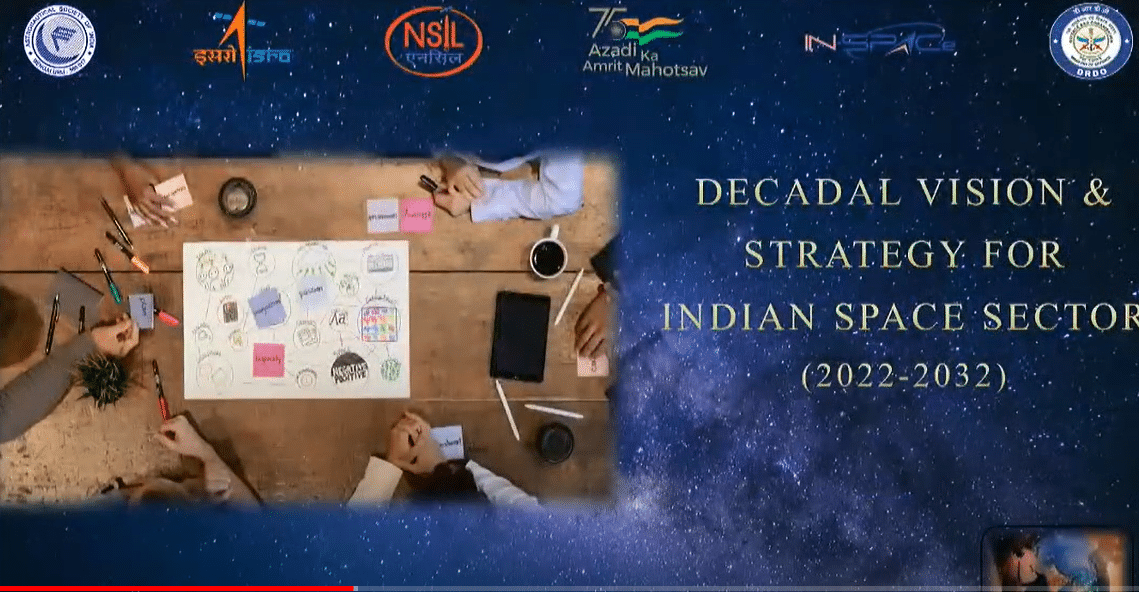Antrix, the commercial arm of ISRO, anticipates that the Indian space sector can hit $50 billion by 2024 provided there’s an enabling policy support and a conducive ecosystem. The rise of New Space sector coincides with a lot of technological innovations such as 5G and AI that will disrupt the marketplace and spawn new businesses, leading to an uptick in consumer demand for innovative products and services.
The tech relevance of space and its economic contribution would increase by leaps and bound, underscoring the necessity of a dedicated space bill to streamline the sector’s vision, channelize its approach and join forces to create a durable space ecosystem.
At the inaugural session of the National Conference on Development of Space Startup Ecosystem in India ( DeSSEI) organized by Astronautical Society of India( ASI), decadal vision of India’s space was discussed.
Next decade
“We are committed to focus on R&D to maintain a competitive advantage as a national priority. We will continue with focus on cost-effectiveness, payload growth, and technology advancements, as well as indigenization that leads to Aatma Nirbhar Bharat.”, says Victor Joseph, Associate Scientific Secretary, ISRO.
In the past few years, ISRO has taken an active step to support and hand-hold the nascent private sector towards the creation of a cutting-edge tech ecosystem.
“If we look at the current scenario, more than 80% of what we do comes from industry, including sub systems and components. In last few years, we have emphasized more on newer business models and technology transfers”, he adds.
In the Immediate future, ISRO expects a rapid increase in end-to-end SSLV through industry. “Through InSPACE, ISRO is trying to promote ease of doing business, single window mechanism, conformity to international liability and open data policy”.
Today 93% of space economy is on the application side, which has a lower risk compared to downstream, launch vehicles or ground stations. Taking stock of this and the growing market appetite for newer applications that rely on space, ISRO has directed its focus areas.
“On the space application side and EO data/ constellations for the global market. On the communications side, broadband through hybrid of LEO, MEO, GEO. On the navigation side, a global high accuracy NaVIC constellation. Once the target is fixed, we need to setup a roadmap”.
Policy enablement
“There’s a tectonic shift taking place. Military and civilian lines are getting blurred which is leading to a new opportunity and convergence in R&D. We are at the threshold, at the brink, of going out of near earth zone and into Earth-Mars-Moon explorations. There is immense possibility of parallel economies superior to unlike anything that exists today and at a progressively lower price points. Space-based applications are made available to masses, which creates enormous business opportunities and a large consumer base”, says DV Khot, Director General, Defense Space Agency.
At this transformative space epoch, the role of a coherent policy cannot be understated. In order to realize the Indian space vision and to harness vast reservoirs of untapped potential and develop new indigenous solutions, space policy will provide the right direction, energizing the vibrant space community in India.
“Type of policy is absolutely critical. We need to handhold the startups, support space industry explosion, and create avenues for collaborative and lateral exchange between all the silos that exist today. To unleash larger talent pool of the country, we need to create and retain that pool”, he adds.
Renewed approach
In line towards tech indigenization and a joint collaborative endeavor, there’s a need of a fresh thinking, eschewing old dogmas and restarting with brio. Connotations associated with startup – of a bootstrapped entity that becomes lucrative through a mix of investor confidence, instinctive grit, perspicacity and dint of luck – may need to be broadened and more attuned to local realities.
“We have to identify local applications, spin-offs, and incentivize the startups. Each and every village need to have a startup. Startup need not be seen as just as a commercial entity. Technical mentorship, incentives, handholding is needed. Innovation processes and management is needed to develop this ecosystem”, says Sudheer Kumar, Director, CBPO.
ISRO has hitherto donned the mantle of a tech-enabler as well as a mentor for budding space entrepreneurs by providing crucial technology as well as other wherewithal. This needs to be enhanced now, so that there’s an osmotic culture of mentorship that doesn’t stop only at ISRO’s door and includes all stakeholders.











